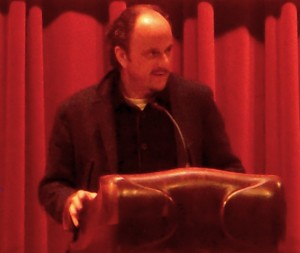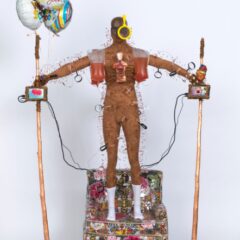The big question at the sold out “Evening with Jeffrey Eugenides” at the Free Library Tuesday night was posed mid-way through the Q&A after a marvelous reading by the author from his new novel, The Marriage Plot. The questioner fumbled around with words that didn’t make a coherent question but which Eugenides knew the meaning of: Basically, how autobiographical is Middlesex, his 2002 Pulitzer Prize winning novel whose main character is an intersex individual of Greek descent from Detroit named Cal Stephanides.

This question followed another about his seemingly high empathy quotient: How could he possibly get inside the female mind and portray it so astutely, completely and naturally, as with the character Madeleine in the Marriage Plot? The author said he creates characters out of bits and pieces of a lot of people and with a lot of his own experience mixed in. He imagines himself in situations and makes up a lot, but he also does his research.
He went on to say that while he wants to (and does) use his own biographical material in his books it’s hard to do that because he gets so involved in the reflections, memories and recounting that it becomes more reportage than storytelling. So while many of his characters actually do things he actually did in his life (Mitchell in The Marriage Plot goes to India to work with Mother Theresa — so did Eugenides) that appears to be framework. It is harder for him to write his emotional autobiography into the story. First and foremost he’s writing fiction — something he does daily, sitting in his office typing out 800 words a day. Writing is a job and hard work, he said, but he’s happy it’s his job.
Meanwhile, back to the big question. Eugenides told the answer in all dead seriousness: Cal Stephanides is as far away from his biological experience as he could get. To make himself even clearer, he said he did not have an intersex condition. Then this great storyteller, who speaks with the same kind of pithy, funny, observations as he writes in his books, went on to tell the back story of why he wanted to write Middlesex.
He read Michel Foucault’s re-discovered memoirs of the 19th Century hermaphrodite, Herculine Barbin. Barbin grew up female and went to a convent school but was later judged male and lived a miserable life ending in suicide. The story was so dramatic, but the convent schoolgirl’s telling of it was so evasive and lacking in emotional and physical details it left Eugenides frustrated — and interested in writing a story — including all the emotional and physical details — with an intersex narrator.
He wanted a narrator who is completely outside of normal and could be omniscient like Terisius in Ovid’s Metamorphosis, who is wise and has been both man and woman and knows the answer to important questions like who has more fun with sex, men or women.
The perfect narrator is an intersex narrator, he said. And by the way, the name Middlesex, well it conjures many things, but a fact is that Eugenides grew up on Middlesex Blvd. in Grosse Point Park, MI.









